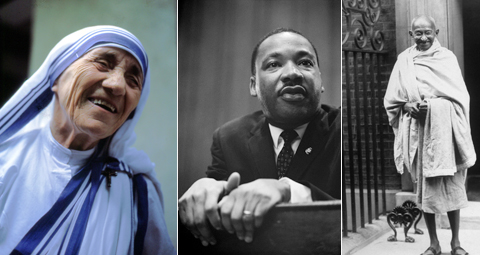May 26 | ![]() 0 COMMENTS
0 COMMENTS ![]() print
print

Now is the time for non-violence
Many have sought peaceful solutions—and momentum is building, writes HONOR HANIA
PEOPLE from all over the world gathered in Rome in mid-April last year to attend a conference on ‘Non-violence and Just Peace.’ Subtitled ‘Contributing to the Catholic Understanding of and Commitment to Nonviolence,’ the event was co-hosted by the Pontifical Council for Justice and Peace and the international Catholic peace organisation Pax Christi. Its intention was to examine ways in which the Catholic Church can deepen its understanding of nonviolence. At the end of the three-day conference, the 80 participants made a statement calling on the Church to ‘no longer use or teach ‘just war’ theory.’
For centuries the Church has promoted the ‘just war’ theory. The purpose of this theory is to ensure war is morally justifiable by applying a set of criteria, all of which must be met for a war to be considered ‘just.’ The criteria are split into two groups: ‘right to go to war’ and ‘right conduct in war.’ The first concerns the morality of going to war, and the second examines moral conduct during war.
But in a statement after the conference, the participants said clearly: “We believe there is no just war.” They maintained that too often the ‘just war’ theory has been used to endorse war rather than to prevent or limit it. Suggesting that a ‘just war’ is possible also undermines efforts to find other ways of avoiding conflict; the continued recourse to the theory ‘prevents creative thinking’ about non-violent alternatives, the conference participants said.
The conference also asked Pope Francis to promote the message of non-violence widely within the Church. In January 2017 he did just that. His World Day of Peace Message was titled ‘Nonviolence: a Style of Politics for Peace.’ Non-violence is sometimes seen as demonstrating passivity, surrender or lack of involvement. Pope Francis rejected this idea, and, citing the examples of Mahatma Gandhi, Martin Luther King and St Teresa of Calcutta, proposed that history has shown that active non-violence is more powerful than violence.
Indeed, the successful experiences of non-violent struggle in many countries has made non-violent solutions seem more desirable and more possible. And we remember that in the context of first-century Palestine, in the face of an occupation by a foreign power and a strong movement to overthrow the oppressors, Jesus consistently called for non-violent response.
In his message, Pope Francis said: “To be true followers of Jesus today also includes embracing his teaching about non-violence.”
He recommended the Sermon on the Mount as a ‘manual’ for peace making, and cited Jesus’ own example: “He unfailingly preached God’s unconditional love, which welcomes and forgives. He taught his disciples to love their enemies (Matthew 5:44) and to turn the other cheek (Matthew 5:39). When he stopped her accusers from stoning the woman caught in adultery (John 8:1-11), and when, on the night before he died, he told Peter to put away his sword (Matthew 26:52), Jesus marked out the path of non-violence.”
But what does Christian non-violence mean?
Non-violence is generally defined as ‘the use of peaceful means, not force, to bring about political or social change.’ It means, as Martin Luther King said, that in situations of potential conflict, we must find ‘a method which rejects revenge, aggression and retaliation. “But for Christians it means something more. Pope Benedict XVI put it succinctly: “For Christians, non-violence is not merely tactical behaviour but a person’s way of being.”
The Rome conference stated: “The time has come for our Church to be a living witness and to invest far greater human and financial resources in promoting a spirituality and practice of active non-violence and informing and training our Catholic communities in effective non-violent practices. In all of this, Jesus is our inspiration and model.”
Along with partners in other Christian traditions, the Catholic Church in Scotland has taken up this challenge. In July of this year, a conference titled ‘Reclaiming Gospel Nonviolence’ will take place at St Mary’s Monastery in Kinnoull, Perth, and will look at how the theme of non-violence is central to Christianity. The conference will include workshops and discussions on how Scotland can make Gospel non-violence a living reality for the individual, society and the Church.
The conference will also feature guest speakers, including Fr John Dear, a writer and activist who has worked in the field of non-violence and was a delegate at the 2016 conference on non-violence in Rome, and Lucas Johnson, the general secretary of the International Fellowship of Reconciliation.
Honor Hania is chair of Justice and Peace Scotland.
If you would like further information on the conference or are interested in knowing more about Christian non-violence, email J&P Scotland at: [email protected] or phone 0141 333 0238.











